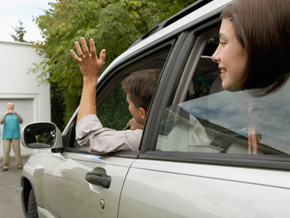Safer Commutes

Photo: Thinkstock
As summer approaches, many teens are looking forward to taking driver's ed and claiming their license in time for school in the fall. (And, to be sure, many parents are happy to get a break from chauffeur duty.) Driving themselves to and from school may be more convenient than relying on the bus or parents, but according to an Insurance Institute for Highway Safety study, it comes with risks.
Researchers collected data on crashes from September 2001 to August 2004 in Fairfax County, Virginia, a Washington, D.C., suburb that has the largest public school system in the state. The data showed a spike in crashes during morning and afternoon school commute times. In fact, about 30 percent of crashes involving 16- and 17-year-olds were happening during school commute times.
The teen drivers were less likely to have been speeding or drinking before commuting crashes, compared with those late at night, suggesting that it wasn't their behavior that was causing the crashes. In fact, the research suggested that fatigue and distraction might play a role, as would simply an increase of novice drivers on the road at the same time. The Fairfax County study didn't find an increase of accidents during lunchtime, likely because the school district has a closed policy—kids aren't allowed off school grounds at lunchtime.
Researchers collected data on crashes from September 2001 to August 2004 in Fairfax County, Virginia, a Washington, D.C., suburb that has the largest public school system in the state. The data showed a spike in crashes during morning and afternoon school commute times. In fact, about 30 percent of crashes involving 16- and 17-year-olds were happening during school commute times.
The teen drivers were less likely to have been speeding or drinking before commuting crashes, compared with those late at night, suggesting that it wasn't their behavior that was causing the crashes. In fact, the research suggested that fatigue and distraction might play a role, as would simply an increase of novice drivers on the road at the same time. The Fairfax County study didn't find an increase of accidents during lunchtime, likely because the school district has a closed policy—kids aren't allowed off school grounds at lunchtime.
If your teen is commuting to school, Stephen Wallace, chairman and chief executive officer of Students Against Destructive Decisions (SADD), suggests taking some extra precautions:
• Alert your teens. Encourage them to pay extra attention to driving situations—such as commuting and driving at night—that tend to be most dangerous.
• Make an agreement. If you and your teen co-author a driving agreement, one of the stipulations on it may be that they must get a minimum number of hours of sleep the night before. According to a 2008 survey of 3,580 students by Liberty Mutual and SADD, teens who had gotten fewer than eight hours of sleep were twice as likely to say they have fallen asleep at the wheel (20 percent) than those who had gotten eight or more hours of sleep.
• Encourage them to speak up. Help your teen figure out how to speak up when friends aren't driving safely. A recent national study by Liberty Mutual and SADD revealed that only about half of the teens surveyed would ask another teen driver to stop distracting behavior like racing other cars, texting or using a cell phone. But when they were in the driver's seat, they were overwhelmingly likely to stop distracting behaviors if asked to by another passenger.
• Alert your teens. Encourage them to pay extra attention to driving situations—such as commuting and driving at night—that tend to be most dangerous.
• Make an agreement. If you and your teen co-author a driving agreement, one of the stipulations on it may be that they must get a minimum number of hours of sleep the night before. According to a 2008 survey of 3,580 students by Liberty Mutual and SADD, teens who had gotten fewer than eight hours of sleep were twice as likely to say they have fallen asleep at the wheel (20 percent) than those who had gotten eight or more hours of sleep.
• Encourage them to speak up. Help your teen figure out how to speak up when friends aren't driving safely. A recent national study by Liberty Mutual and SADD revealed that only about half of the teens surveyed would ask another teen driver to stop distracting behavior like racing other cars, texting or using a cell phone. But when they were in the driver's seat, they were overwhelmingly likely to stop distracting behaviors if asked to by another passenger.



